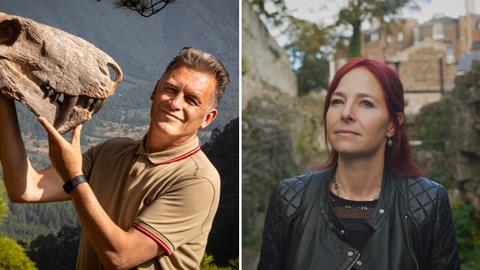Two new films from the BBC and Humanists UK, featuring Chris Packham and Dr Alice Roberts, seek to explain the origin of our planet from a scientific, secular point of view. But in ignoring the divine, they raise more spiritual questions than they answer, says George Pitcher

I’ve watched two media events in the past few days that have raised profound questions on the meaning of life.
The first, a short animated video voiced by celebrity scientist Professor Alice Roberts, is from the campaign group Humanists UK. Called Where Do We Come From?, it is aimed at primary school children as part of the Understanding Humanism platform.
The other is the opening episode of a four-part docuseries from BBC2 called Earth, fronted by celebrity naturalist Chris Packham, which examines how our planet was formed over hundreds of millions of years of its pre-history.
The more they ignore the divine hand, the more they draw attention to it
Both films are as excellent as they are entirely different. The Humanists’ offering is a cute and engaging cartoon about how the Big Bang led to planets and life. Packham’s documentaries are the kind of gothic extravaganzas that the BBC do so splendidly, and which alone justify the corporation’s licence fee, if not its very existence, in my opinion.
A divine absence
What they both have in common is that they ignore theology. I can understand why. I like the people of Humanists UK, and have even shared a conference platform with them at a BBC event once. They are reasonable, kind and as stylistically different from what the philosopher Terry Eagleton dubbed “Ditchkins” – an angry composite of celebrity atheists Richard Dawkins and the late Christopher Hitchens – as it is possible to be.
But it’s still true that they campaign to have religion expunged from the public square. A cursory browse of their website shows that they set up strawman struggles. They campaign, for instance, for the teaching of evolution over creationism in schools. It already is so taught, except in the most nutjob of academies – and Ofsted can regulate those.
So it’s only to be expected that Humanists are unlikely to mention the possibility of a deity in its offering.
The BBC and the Humanists, in their studiously secular approach, are creating their own yawning gaps
Packham’s brief, meanwhile, is to trace the geological narrative of Earth from a molten mass of lava and gas to our present age’s Eden. Again, he bears no burden of responsibility to bring religious belief into that story.
But my issue is this: The more they ignore the divine hand in what we might just call the creation of all this, the more they draw attention to it. Both the Humanists and Packham are trying to tell their stories while ignoring an elephantine God in the room.
Those of us with a religious faith are often accused of worshipping a “god of the gaps”. That is, a desire to fill in any hole in scientific knowledge with our divinity – an ever-diminishing effort on our part, it’s claimed, as science irresistibly marches towards a complete explanation and understanding of everything.
Time and space
But the BBC and the Humanists, in their studiously secular approach, are the very ones here who are creating their own yawning gaps.
Let me offer a couple of examples. Where Do We Come From? opens with the Big Bang and Professor Roberts intoning that: “Billions of years ago the whole universe was packed tightly together, smaller than a grain of sand.”
Eh? As Roberts will know, the physics jury has been out on that one for some centuries. What space and, therefore, time would this thing of infinite mass and density be occupying? Following on, why is there something rather than nothing? Theology posits some answers to that, but Roberts and, consequently, the Humanists don’t. I know this is for primary school children, but isn’t this exactly the kind of speculation, invited by their own scripting, that they want to remove from schools?
Likewise, the school video goes on to say that: “you are made from stardust”. This may not be religious talk, but it’s a mushy-hippy spirituality that is reminiscent of Joni Mitchell singing “We are stardust…and we’ve got to get ourselves back to the garden.” I thought it was we religious folk that did this pre-lapsarian stuff?
A question of faith
As for Packham, already nicknamed Sir Chris Pachamborough, he stands on a mountain range and, referencing the destruction of 90 per cent of all life on earth 252 million years ago, asks the grown-up question: “Do we want those sorts of extinctions on our conscience? I don’t think so.”
It doesn’t seem to occur to him that the conscience to which he refers is just as much a part of the created order he surveys as anything else. As is the human consciousness with which he surveys it. As, for that matter, are hope and love and, indeed, faith.
All these may have evolved from volcanic eruptions, I suppose, or a selfish gene. But, then again, whose selfish gene would that be? We may again be witnessing a scientism that will accept no miracles other than its own.
This is not a competition. It isn’t us or them. Scientific discovery and theological exploration go hand in hand through history and, one hopes, into the future. But it’s also just to say that the Humanists and the BBC raise as many, if not more, God-shaped questions than they seek to ignore.






































4 Readers' comments